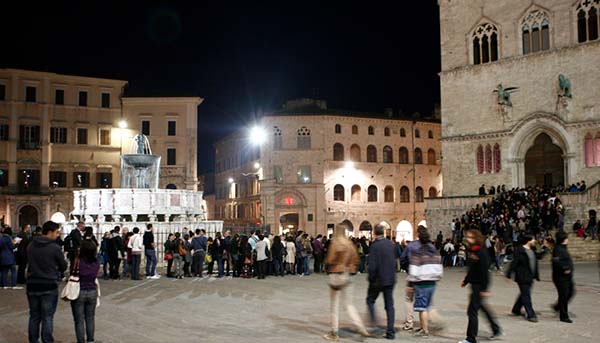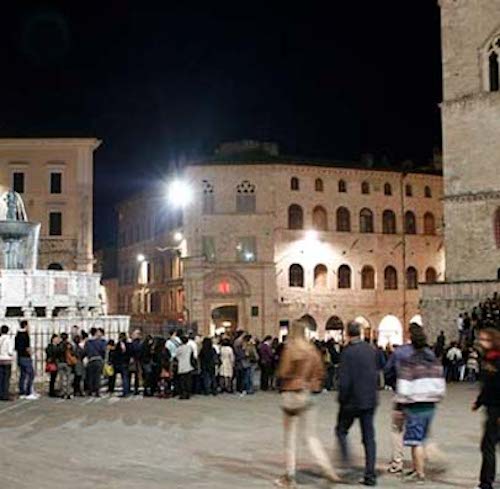by Fabio Chiusi
Article first published here and reproduced with the kind permission of Wired Italia.

On 17 October 2013, when Arianna Ciccone announced that the necessary conditions to hold the 2014 edition of the International Festival of Journalism in Perugia were lacking, something extraordinary happened on the web, something that doesn’t happen every day. Arianna, who created the Festival with her partner Christopher Potter, tells Wired.it that “there were lots of tweets, Facebook posts and emails from ordinary people, attached to the Festival, and Italian and foreign journalists who asked us not to close down”.
Many messages arrived, such as those collected in this Storify that recalls the days when the festival – an event of real Italian excellence, globally recognized – risked closing, at least for one year. There was an incredible avalanche of goodwill, on that same web that, according to some, too often hates, insults and threatens. That’s not all. An idea was created, from those tweets, posts and emails, to find a solution to the unsustainable lack of funds from local public institutions, to try the method of crowdfunding. This was an unprecedented experiment in Italy for such an event. A “challenge”, says Arianna who, along with Chris, decided to try. The target was €100,000 to reach in 90 days, starting on 02 November 2013.
Now, three months later, we know that the bet paid off.
€115,350 has been collected, €15,350 more than the planned figure. How was this possible? First of all, the numbers. The online campaign financed “from the ground up” picked up 746 donors, including 33 Gold Donors (donors who paid at least €1,000) comprising eleven individuals (including the former editor of The Economist Bill Emmott and the journalist Beppe Severgnini) and 22 companies, associations, institutions or foundations (here the full list). There were donors from 14 different countries: Austria, Canada, Czech Republic, Finland, France, Germany, Italy, The Netherlands, Russia, Spain, Switzerland, Thailand, UK, USA.
As shown in this graph, created with the data of the campaign (via Datamediahub), where the donations are detailed date by date, the dream came true little by little, day after day, reaching peaks of over €20,000 in two cases, and collecting nearly €34,000 euros in the last four days.
#ijf14 donations chronology
Gold Donors donated €87,434, i.e. 75.8% of the total sum, with an average donation of about €2,650. All the other donors gave €27,916, with varying amounts starting from €10 and an average donation of €39.15 per person. For Ciccone it is a significant figure: “According to Chiara Spinelli, an expert in this field – who we met on Twitter and who helped us to set up the platform, spontaneously and for free, with Claudio Bedino of Starteed and Salvo Mizzi of Working Capital – a high average is considered between 25 and 30 euros”. Of course “the nature of fund-raising depends on who proposes it and what is the goal “, Arianna adds, but “in terms of participation 746 donors are a lot, and in this figure there should also be included the students of the Galileo Galilei secondary school, which became a Gold Donor with a €1,000 donation, raised by approximately 1,200 students. A very beautiful and moving gesture”.
Numbers, however, do not tell the whole story. The reasons for the success of the initiative lay in consolidated, real and deep human relationships developed through the web that, according to skeptics, would not be appropriate for going beyond a lazy ‘like’ or a virtual “friendship”. Arianna refers to the “strong reputation of the festival” but also to “a very established community that revolves around the festival and around me. Friendships and acquaintances were born on the network, have grown over time and have strengthened thanks to a certain way of living in the digital world”. The success of the crowdfunding is an occasion to reflect on this aspect too. Ciccone says it clearly: “Through this fund raising I have seen all the virtuous dynamics of the web and social networks”. “The way I have always been on social networks is not a secondary factor for me. For better or worse it is an authentic way, and has been perceived as such, and this certainly has “humanized” the crowdfunding. One of the comments that struck me the most was written by one Facebook friend who wrote: ‘I donated because I trust Arianna, I respect her as a person and as a journalist”. Another gratifying comment on Facebook was posted by the professor and expert on new media, Giovanni Boccia Artieri that said: “I believe there is love for the festival, for you, but maybe there is something more which has to do with the relationship you have built thinking about journalism”. A form of “crowdloving”, assuming a greater significance in a time when the profession is in the crossfire of politics and public opinion.
There are still some things to improve, of course, and in explaining it Arianna takes a look on the future of the event: there could have been “a bigger push on the part of those who participated and involvement of those who have donated” she says, before adding that “if studied and explored this aspect will become the main feature of crowdfunding 2015, certainly based on other motivations (which does not mean the end of the festival and/or the refusal of local institutional funding)”.
“What has happened this year with crowdfunding has too many important meanings not to continue. Maybe the next goal will be to reach a lower figure, and put at the center of the project the involvement of people in the decision-making process in regard to festival content: forums, threads, votes on issues to be discussed and speakers to be invited… It could really be an amazing experience”. Perhaps, even better than this year.

Donation of 290 euros from the pupils of the Alessi secondary school in Perugia.
On the bag is written “Per Arianna dagli studenti del Liceo Alessi p.s. scusa per il packaging”.


